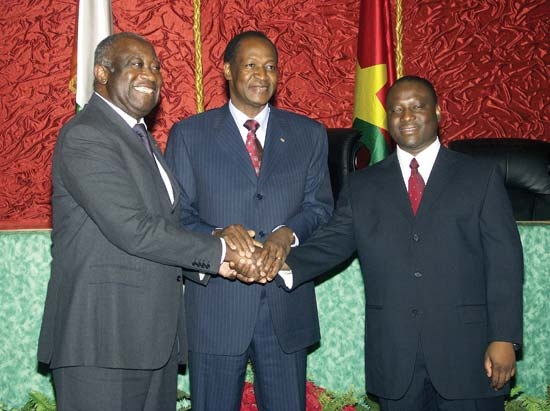Gbagbo, Laurent
president of Côte d’Ivoire
born May 31, 1945, Gagnoa, Côte d'Ivoire
 African politician who became president of Côte d'Ivoire in 2000. During his presidency, he grappled with civil war and an extended period of disunity.
African politician who became president of Côte d'Ivoire in 2000. During his presidency, he grappled with civil war and an extended period of disunity.Born to a Roman Catholic family of the Bete people, Gbagbo moved to the capital city in the 1960s and attended the Traditional College of Abidjan (1965) and then studied history at the University of Abidjan (B.A., 1969). He extended his studies at the Sorbonne (M.A., 1970) in Paris and returned to Abidjan to teach in the Classical College. Gbagbo was arrested and imprisoned in 1971–73 for subversion. Following his release, he joined the faculty at the University of Abidjan's Institute of History, Art, and African Archeology in 1974 while simultaneously earning a doctorate (1979) from the Sorbonne.
Although Gbagbo was elevated to director of the institute in 1980, by 1982 his dissident activities had again raised the ire of the government. He formed an opposition group and went into exile in France. When he returned to Côte d'Ivoire in September 1988, he was elected to lead the Ivorian Popular Front. Then, in April 1990, the country's president, Félix Houphouët-Boigny (Houphouët-Boigny, Félix), agreed to recognize opposition parties and, for the first time in the country's history, scheduled multiparty elections.
Houphouët-Boigny and his party dominated the elections, and Gbagbo resumed his political activism, enduring another prison sentence for having organized a student protest in 1992. Houphouët-Boigny died in office in 1993 and was succeeded by his finance minister, Henri Konan Bédié, who in turn was deposed in a 1999 military coup led by Gen. Robert Gueï. In the 2000 presidential election Gueï defeated Gbagbo, though critics claimed the result was fraudulent. In the ensuing uproar, Gueï fled the country, and Gbagbo took over the presidency.
Almost immediately after Gbagbo took office, rebel forces revolted, and the situation quickly deteriorated into a full-fledged civil war in September 2002. The French assisted in brokering a peace agreement in January 2003, and fighting was declared over in July of that year. The country remained fragmented, however, with the rebels controlling the northern part of the country and with United Nations (UN) forces overseeing a buffer zone between the north and the south. Despite numerous efforts at reunification, the country was racked with sporadic violence, riots, and protests against Gbagbo's government. A potential breakthrough came in March 2007 with the institution of a power-sharing deal between Gbagbo and rebel forces commander Guillaume Soro. Gbagbo remained president, and Soro was made the country's prime minister. The UN ceased patrolling the buffer zone, and the process of disarming the militias loyal to both sides began.
- Donna Summer
- Donnay, Maurice
- Donne, John
- Donnelly, Ignatius
- Donner, Georg Raphael
- Donner Pass
- Donoso, José
- Donostia–San Sebastián
- Donoughmore Commission
- Donovan
- Donovan, Shaun
- Donovan, William J
- Don Pacifico Affair
- Don Quixote
- Don Raimundo
- Don River
- Don, River
- Don Schollander
- Don Shula
- Don Siegel
- Donskoy, Mark
- Donus
- doodle
- Dooley, Thomas Anthony
- Doolin, Bill